Donkeys are herbivorous animals and they are used to eating grass, herbs, and other plants in the wild. Whereas domesticated donkeys mostly eat hay, straw, grass, and other feed like pellets. When it comes to feeding, one should ensure the donkeys are getting an adequate supply of fiber. And the best fodder, in that case, includes straw and hay that provides ample amounts of fiber but with low sugar. Fruits and vegetables could also be fed to your donkey in small portions. Now, let’s go deep down and see what a donkey eats and learn more about their eating habits.
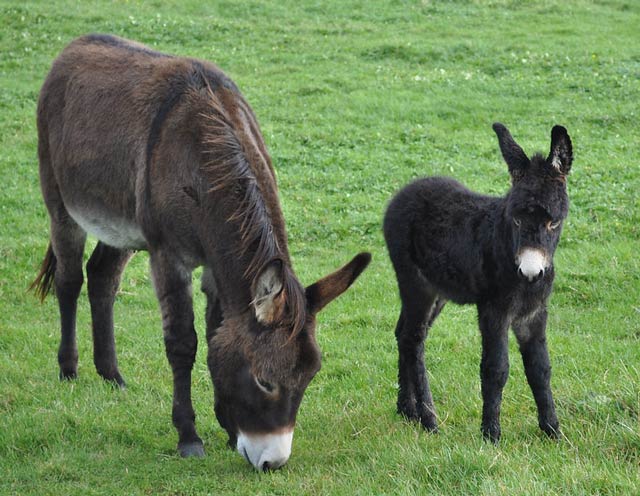
What Does a Donkey Eat on a Daily Basis?
As mentioned above, fiber is essential for donkeys to maintain a healthy body. Hence, straw and hay that contain lots of fiber are preferred foods to feed your donkey daily. When we say straw, it is a collective term that includes different types of straw which have different nutritional values. Proper care must be taken while feeding your donkey with straw, as some kinds may cause harm to your donkey.
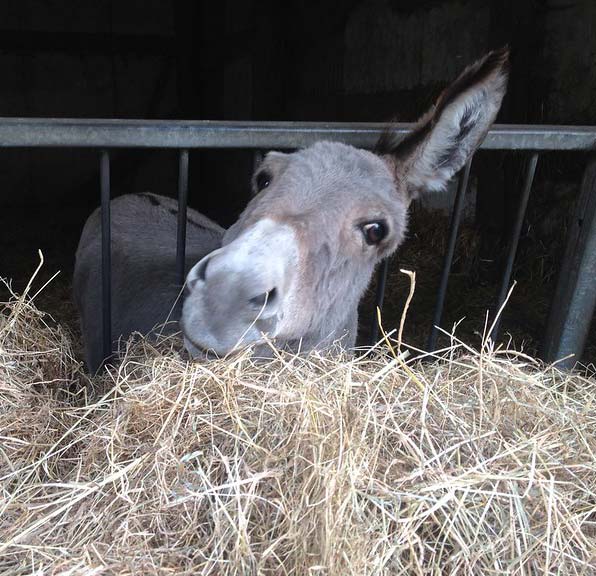
Barley straw is the most commonly fed straw to donkeys. The high fiber it holds, accompanied by low sugar, is similar to the food that donkeys eat in the wild. Barley straw is the most preferred straw to feed your donkeys during summer. Oat straw, which has higher nutritional values when compared to barley straw, can be fed to donkeys that seem unhealthy or underweight. If your donkey is young and healthy with a good set of teeth, wheat straw would be a good option since it has high fibers which are a bit difficult to chew. Avoid linseed straw as it is poisonous, if not boiled, to donkeys.
When it is winter, hay is the better option to rely on, provided that you have an adequate supply of it to last throughout the winter. When feeding hay, always be careful to check for molds since moldy hay can cause allergic reactions in your donkey. Hay also has different nutritional values depending on the time they get cut. There are also various kinds of hay, namely meadow hay, seed hay, and hay produced from a cow pasture. When feeding hay to your donkey, be cautious to check for ragworts, as it is poisonous to donkeys.
If you want to make your donkey stronger or to put on some weight, high-fiber pellets are a good choice. These are easily available and accessible in the market and are even produced by many brands. You can easily choose the one that suits your requirements. If your donkey is not eating well, or is underweight, including sugar beet in small amounts in its diet could help it regain its appetite and tempt it to eat more. Dried sugar beet pulp is available in the market and can be soaked in water and fed to your donkey to serve your purpose.
You can also feed fruits and vegetables to your donkey, in addition to hay and grass, in a limited quantity. 1 or 2 a day won’t do harm to your donkey. Carrots, apples, turnips, bananas, etc., are popular feed for donkeys, which they love. Make sure your donkey won’t choke on these fruits and vegetables by cutting them into small pieces.
Above all, water is of utmost importance since life cannot sustain without water for more than a few days. Donkeys sweat a lot, a part of their biological features, which all the more increases the need for them to drink more water. Always provide your donkey with clean and fresh water. You can also provide warm water in winter if winters are harsh where you reside.
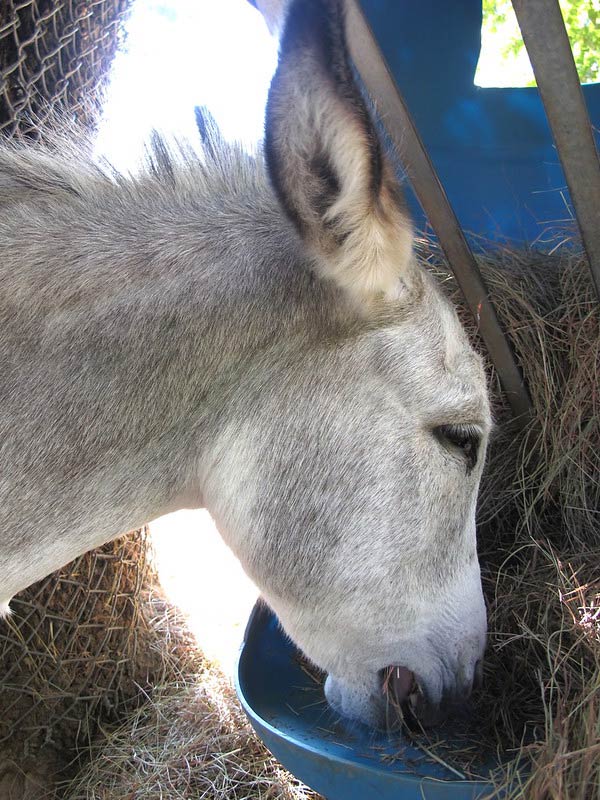
Treats Your Donkey Will Love
Feeding your donkey with what it loves is the donkey’s love language. And hence, treats are inevitable parts of the process of loving your donkey. Fruits and vegetables are most commonly used as treats, as they cannot be fed in large quantities. Carrots, turnips, pears, swedes, and hay pellets are some of the treats that your donkey will drool over. These can be given to your donkey cut into wedges, making it easier for them to chew and swallow.
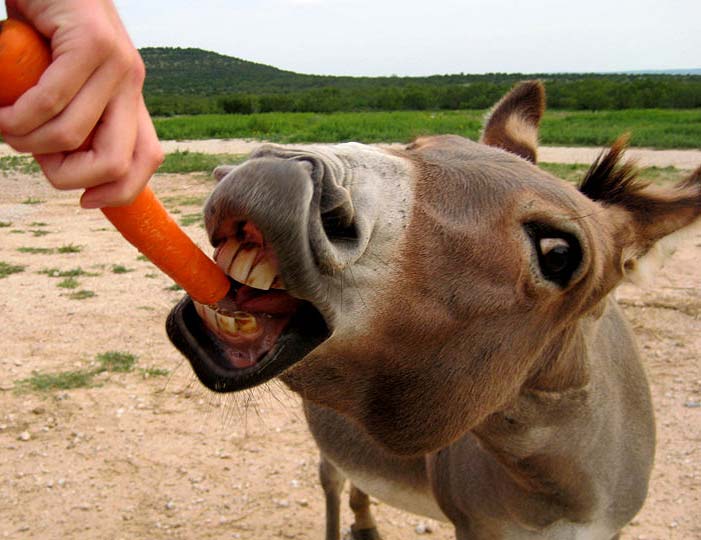
What Not to Feed Your Donkey?
Donkeys are herbivorous animals by nature. This means that their digestive systems can only work with plant-based products and not animal-based ones. Hence, refrain from feeding animal protein. Chocolates, cakes, biscuits, and bread should not be consumed by your donkey, as well as potatoes, onions, garlic, leeks, aubergines, and pepper. Also, be sure not to feed leftover food to your donkey as it might compromise their digestive system. Moldy meals are also to be avoided, to prevent your donkey from taking up allergies.
How Much Should Your Donkey Eat?
Donkeys are one among those species that can survive under any circumstances and adapt to any environment. This is partly the merit of their efficient metabolism, which does not require much energy, for the digestion of the food they consume. And this explains how donkeys manage to spend about 16 hours grazing themselves. Their love for food is evident in this matter. Experts say that a healthy adult donkey could weigh between 220 lbs and 1000 lbs.
Some Tips on Keeping Your Donkey Healthy
- Provide adequate clean water for your donkey to consume at any time of the day.
- Do not overfeed your donkey, as this can lead to overweight and obesity.
- Make sure that the feed you provide has all the diet requirements of your donkey, as well as of the highest quality.
- Be careful not to include a feed that is high in sugar content.
- Check for molds and other foreign materials in the feed before giving them to your donkey. Look out for plastic bags, as they can harm your donkey.
- Provide your donkey with small amounts of food at a time; if given all of a sudden, it might cause issues with digestion.
- Try to feed your donkey at the same time every day, with a consistent feeding method.
- After letting your donkey graze for a long time, ensure it gets adequate rest.
- If you are planning to change the diet for your donkey, do not shift to a new diet immediately, but change it gradually, taking enough time.
- Provide your donkey with mineral licks and balancers whenever necessary.
When to Administer Mineral Supplements?
Vitamins and minerals have a significant role as food and water to donkeys. If not taken care of properly, it can lead to serious deficiencies and health hazards. At times your donkey might show symptoms like eating dirt or licking or chewing objects. If you notice this behavior, it is a signal that your donkey is suffering from a salt deficiency.
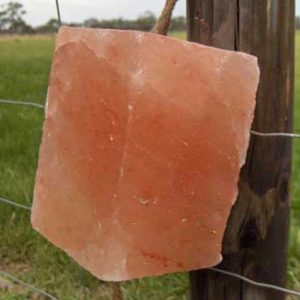
To treat this salt mixed with food or salt lick blocks could be given to your donkey. Similar blocks of minerals can be found in the market that can be administered according to the needs. While buying the mineralized blocks, confirm that it is designed for donkeys, as blocks intended for other species of livestock can cause harm to your donkey. But before doing anything, consult your donkey’s veterinarian to know more about its requirements.
Wild Donkeys and Pet Donkeys; Are Their Feeding Patterns Same?
Wild donkeys are those species of animals that have adapted to survive in the arid and semi-arid areas of the world. In those areas where one couldn’t find quality vegetation, they have survived through years with poor diets and health conditions. Evolution has even given them the capacity to digest thorny plants and succulents and absorb moisture from what they get to eat. And thus, they are adapted to a diet that lacks nutrients and essential minerals, but they survive with what they got.
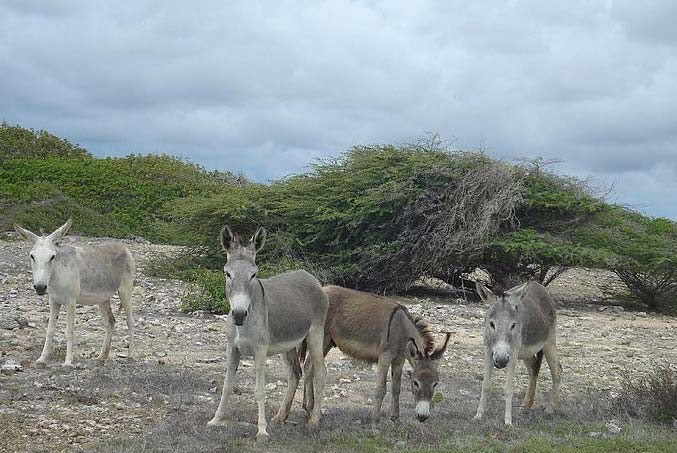
This stands completely in contrast to domesticated donkeys, where all their needs and requirements are met properly. The donkeys we keep won’t be used to the kind of diet that a wild donkey has, and the interchange of diets would never end in good results. Similarly, the foods that are consumed by wild donkeys may not always be good for the digestive system of domesticated donkeys.
If you wish to feed a wild donkey, you can do so by giving them carrots, turnips, or any fruits or vegetables that donkeys love, but the act is not really appreciated since wild donkeys could approach and sometimes even attack humans in the name of food. And when these donkeys approach human beings hoping they would offer food to them, sometimes people can also feed them the wrong food items that can cause harm to the wild donkeys.
When to be Cautious?
Feeding your donkey might be something that gives happiness to you and your donkey, but overfeeding can lead to serious health issues for your donkey. The treats you provide, mainly fruits and vegetables, when given more than what it is supposed to have, are the villains in this situation. Always be careful whether your donkey is gaining extra weight or is becoming obese. Donkeys are also prone to being underweight and weak, which is an equally serious situation as well. If this happens, include those food items in their diet with high fiber content and nutritional values.
Dental issues often affect donkeys, and it could adversely affect your donkey’s diet and well-being. Hence, look for changes in your donkey and its eating habits and take adequate measures to restore it to health. Timely checkups and consultations with the donkey’s veterinarian are always encouraged to keep its health at bay.
Conclusion
Donkeys are cute and lovable creatures that are fond of eating. But there are many specifications when it comes to the eating habits of donkeys. And if you are well informed about those patterns, taking care of a donkey is no big task but something you can easily tackle. If you’ve come this far reading, we are sure that you now have the basic knowledge about donkeys’ diet patterns. Hoping you had a productive time reading, have a good day.
Featured image credits: Maaser Donkey Farm, Lebanon
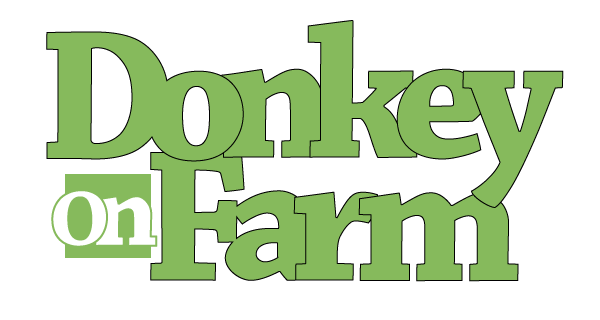
![What Does a Donkey Eat? [And What Not to Feed Them?] what does a donkey eat](https://donkeyonfarm.com/wp-content/uploads/2022/12/What-Does-a-Donkey-Eat.webp)

![Do Donkeys Laugh? [Plus Why Do They Do It?] do-donkeys-laugh](https://donkeyonfarm.com/wp-content/uploads/2022/08/Why-do-donkeys-laugh-270x180.jpg)
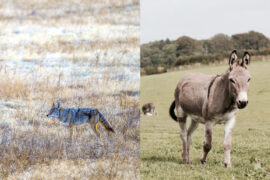
![Should Donkeys Be Stabled at Night? [With Alternatives to a Stable] Should-donkeys-be-stabled-at-night](https://donkeyonfarm.com/wp-content/uploads/2023/04/Should-donkeys-be-stabled-at-night-270x180.jpg)
![Do Donkeys Make Good Pets? [Plus What to Know Before You Get One] Do-Donkeys-Make-Good-Pets](https://donkeyonfarm.com/wp-content/uploads/2022/05/Do-Donkeys-Make-Good-Pets-270x180.jpg)